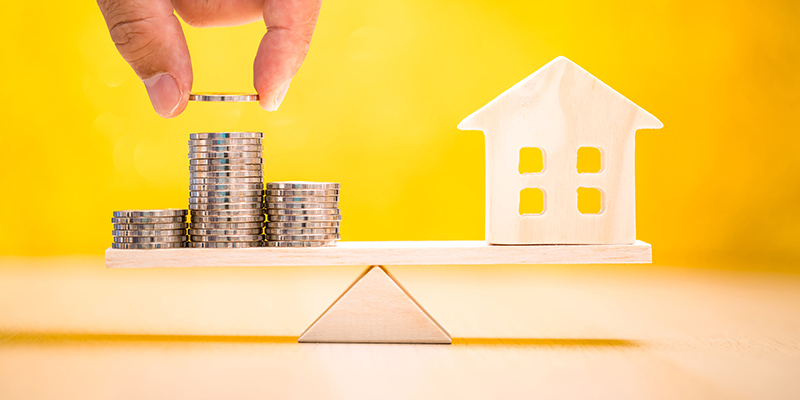Setting the proper rental rate can make or break a landlord’s success in the rental market. An inappropriately priced rental unit can discourage tenants from renting or lead to potential losses. It’s important to strike a balance to make the most out of the rental property.
Factors to Consider: How Much Should I Charge for Rent?
There is no set rule or standard when it comes to determining a rental price. Each rental unit will have a different appropriate price. It will all depend on various factors like amenities, location, market value, size, and others. Let’s break down each consideration below.
1. Property Value
 How do you calculate real rental price? Landlords can often use the property’s overall worth to determine the base rental price. It’s a useful tool for landlords who don’t know where to start. Typically, the rental price of a property should fall between 0.8% and 1.1% of the home’s value. For example, if the home’s value is at $250,000, the rental price should be around $2,000 to $2,750 monthly.
How do you calculate real rental price? Landlords can often use the property’s overall worth to determine the base rental price. It’s a useful tool for landlords who don’t know where to start. Typically, the rental price of a property should fall between 0.8% and 1.1% of the home’s value. For example, if the home’s value is at $250,000, the rental price should be around $2,000 to $2,750 monthly.
However, bear in mind that the actual price or value of the property will affect the rental price. Landlords can usually charge around 1% of the property value if the actual price is below $100,000. Meanwhile, landlords will want to stick to the lower end of the percentage range if the house is over $375,000. Charging too much might discourage potential tenants.
2. Local Rent Rates
How much to rent a house for a month? One of the best ways to determine the rental price is by examining the local rent. What do other landlords in the same area charge? It’s important to get a feel for the local market so you know you’re not over or underpricing.
However, make sure the properties you’re surveying are similar to your own. For example, if you’re renting out a 1-bedroom apartment, you should likewise figure out the average price for 1 bedroom apartment places around the area. Looking at the average rent prices for single-family homes will bloat your estimate. Make sure to compare homes and units that are similar in the following ways:
- Amenities
- Lot size
- Number of rooms and bathrooms
- Year built and most recently remodeled
Apart from surveying other landlords, you can also research rental estimates by zip code. Websites like Apartments.com and HUD’s fair market rents may help. You can also speak with local real estate agents to get a good idea of your location’s average rental prices.
3. Rent Control
Some areas have government-mandated rental caps. Moreover, these laws may also indicate how much you can raise your rent and how often. Make sure to review the laws in your state so you’re not violating any local regulations. You can also ask a lawyer or legal professional for advice or guidance.
4. Features and Amenities
How much should I charge for rent for a room or apartment? One big factor to consider when you determine rent price is the property’s features and amenities. If the rental property has many bedrooms, bathrooms, finishes, furniture, and appliances, you may be able to charge higher. Similarly, you can charge higher rental rates if the apartment, condominium, or community has amenities like gyms, pools, on-site parking, or co-working spaces.
5. Neighborhood Quality
Even if the rental property has all the right features, amenities, and property values, it may not be worth much if the neighborhood is bad. Make sure to assess whether the area has high crime rates. This can significantly reduce the amount you can charge to rent out your property.
Location and positioning may also impact the rental rate. For example, if the property is close to a busy intersection, tenants might not be as willing to pay a high price because of the noise and chaotic environment. Conversely, they may be willing to pay a premium for properties in good neighborhoods or attractive locations.
6. Demand and Seasonality
 Even with a high property value or local rental rates, the overall demand might affect the rental price you can set. In a bad economy, there’s a higher demand for rentals as people are not able to afford housing. Small and cheap apartments will be in particularly high demand as people want to live somewhere affordable.
Even with a high property value or local rental rates, the overall demand might affect the rental price you can set. In a bad economy, there’s a higher demand for rentals as people are not able to afford housing. Small and cheap apartments will be in particularly high demand as people want to live somewhere affordable.
In addition, the time of year may also affect the demand and how you calculate rental rate. For instance, large properties are often more in demand before the school year starts as families want to settle in a home before their kids attend classes. Changes in the season may also affect demand. You’ll often see rental prices dropping in the winter as landlords want to attract more tenants during the season.
Generally speaking, you’ll want to lower the rental rate when demand is low. Conversely, you can charge higher rates when the demand is high for the kind of rental property you’re offering.
7. Rental Cost
Home or apartment rent prices should never be lower than the cost of maintaining and managing rental property. After all, it’s pointless to rent out a unit if it’s not going to earn you money. It would be even worse if you’re at a financial loss in the end. Hence, make sure to consider all the following associated expenses:
- Maintenance costs
- Property management fees (if any)
- Mortgage payments (if any)
- HOA fees
- Vacancy period costs
- Taxes on rental income and the property
8. Market Testing
Even if you consider all these factors, it can still be hard to determine the right rental price. In these cases, it might be wise to simply test the market to land on a good rental rate. You can charge high initially to gauge interest. Be prepared to negotiate at this point. However, if nobody seems to be interested, you can gradually lower the price to find the sweet spot.
Why Is Charging an Appropriate Rental Rate Important?
Charging the appropriate rent prices is important because it can attract quality tenants. These tenants are more likely to pay rent on time and not miss out on any payments. They’re also more satisfied, making them more likely to maintain the property and stay for longer.
Moreover, charging the appropriate rate can maximize profits. Overpricing will lead to extended periods of vacancy while underpricing may result in lost income. Finally, setting the right price can lead to positive reviews online and boost the rental property’s reputation. This can attract more tenants in the future.
A Fair Deal for Everyone
Setting a suitable rental rate for your property is the key to succeeding in the rental market. Getting this wrong can lead to unwanted consequences like lost income, dissatisfied tenants, or not attracting tenants at all.
Are you finding it difficult to appropriately price your rental property? A property management company might help with that. Look through our online directory to find a trustworthy one today!
RELATED ARTICLES:




 Company
Company